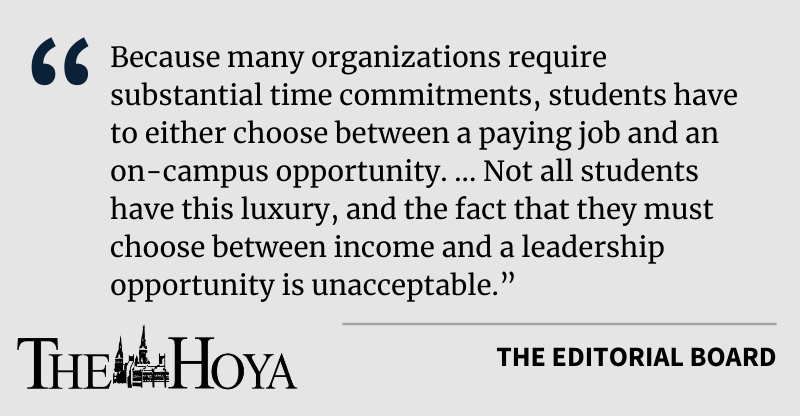No student deserves to miss out on important social and professional experiences because of their personal income background.
The editorial board calls on club leaders at Georgetown University to use their position of privilege to foster increased club inclusivity. Specifically, student leaders who have the privilege of prioritizing leadership commitments over paying jobs must advocate both internally and to the university for their clubs to compensate members for their intensive time commitments, ensuring low-income students have access to these positions in the future.
Georgetown ranked 12th nationwide for highest income inequality among undergraduate students, according to a 2017 study. This disparity, combined with Georgetown’s exceptionally high median family income of $229,100 shows that the Hilltop struggles with rampant inequity. Yet, many clubs’ operations do not have programs that effectively address this disparity. Furthermore, many pre-professional clubs require extensive time commitments from members and leaders.
Student organizations serve important roles on Georgetown’s campus. Many organizations provide strong community and an opportunity to make friends. Additionally, clubs — especially leadership positions within clubs — give students the ability to improve their resume. However, because many organizations, especially ones with a pre-professional focus, require substantial time commitments, students have to either choose between a paying job and an on-campus opportunity or juggle both, which can adversely affect their well-being.
Not all students have this luxury, and the fact that they must choose between income and a leadership opportunity is unacceptable.
Club leadership positions often require students to dedicate more than 15 hours per week — time they could instead use to study or earn money. Mask and Bauble Executive Producer Grace Crozier (COL ’21) often dedicates as much or more time to theater productions as she does to her job, she wrote in an email to The Hoya.
“I work between 10-15 hours a week at my other job in retail,” Crozier wrote in an email to The Hoya. “There are weeks where I — and others — spend more time doing club-related tasks than at my paying job.”
One of the most prominent clubs on the Hilltop, the Georgetown University Student Association, has historically lacked a diverse student population because it does not pay many of its members for time-intensive responsibilities, GUSA Senator Rowlie Flores (COL ’22) wrote in an email to The Hoya. While the president and vice president are given small stipends and the executive officer for the senate is paid hourly, other dedicated members are providing free labor.
The majority of students leaders in student government right now come from privileged backgrounds because they can easily sacrifice paid jobs if need be, Flores wrote.
The Hoya itself is not exempt from this issue either. Some members of our board of editors work more than 30 hours a week to produce content, and our leadership is largely white and high-income. We too must work to compensate our staffers and create a more diverse newsroom. While our leadership is currently working hard to pay our staff for their labor, we still have a long road ahead of us before we achieve this goal.
If the current student leaders of time-intensive clubs were to use their current positions of privilege to advocate for compensation for future students who are less privileged, club diversity could improve.
No two clubs will have the same path to compensating their student leaders. Some clubs may choose to source their funds from graduate donations, especially if they have strong alumni relations. Others may want to explore federal work-study options, if applicable. No matter the avenue clubs pursue, one thing is certain: Student leaders of time-intensive organizations in positions of privilege must use their power to fight for the future diversity of their clubs, and Georgetown must be ready to accept and implement compensation measures.
Certainly, paying student leaders may force an already overwhelming club culture to be even more competitive and potentially toxic. Faced with the prospect of financial compensation, students may want to spend more time on their extracurriculars or join more organizations; they may even approach club applications with greater vigor or relentlessness. However, we cannot let these hesitations stop our efforts to compensate leaders. Furthermore, added competition is a sacrifice worth making if it allows campuswide student leadership to become more diverse and accessible. And even if the process itself becomes more competitive, it will be fairer overall by including students of lower-income backgrounds.
Furthermore, as we plan for the eventual return of on-campus learning, students may be facing significant economic stress because of the lingering burdens of the COVID-19 pandemic. To ensure we support diversity and accessibility as much as possible, student leaders must begin working right away to discover how they will begin paying future members who take on time-intensive responsibilities.
Paying students with high time commitments will not fix all issues of inequity within the Georgetown community. However, it is one step in the right direction toward making our campus a more diverse, accessible place. The editorial board calls on all student leaders to recognize the privilege of leading a club pro bono and to use their positions of power to improve the accessibility and future diversity of their clubs as soon as possible.
Without this immediate action, Georgetown will undoubtedly continue to face extreme issues of inequity and inaccessibility.
The Hoya’s editorial board is composed of six students and is chaired by the opinion editor. Editorials reflect only the beliefs of a majority of the board and are not representative of The Hoya or any individual member of the board.















ha • Nov 21, 2020 at 2:35 am
Demanding competition for your work?
SOUNDS CAPITALIST
how did the Hoya let this slide